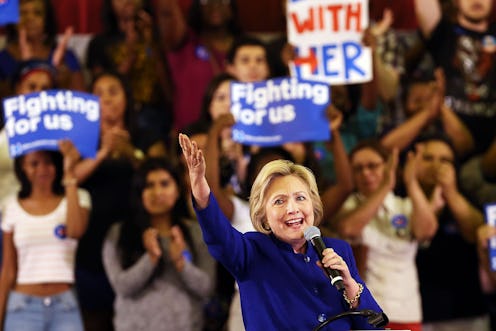News
Clinton Could Join The Ranks Of These Great Women
According to the Associated Press, Hillary Clinton has enough delegates to become the presumptive democratic nominee, which would make her the first female presidential nominee of a major political party in the history of this country. Bernie Sanders could still potentially snag the nomination, but if Clinton wins it would make her the most powerful member of a growing but still very small club of female leaders.
Like the United States, most countries around the world have never seen a female leader. Using data from a 2015 United Nations report, a Pew Research Center study noted that about one-in-ten UN member states has a female leader, and about half of these women were the first female leaders of their countries.
Of this small cohort of women, many were elected relatively recently. For example, Ameenah Gurib of Mauritius became her country’s first popularly elected female head of state last year. Saara Kuugongelwa of Namibia also only began her term as prime minister in 2015, and Hilda Heine began serving as president of the Marshall Islands this past January. Park Geun-hye of South Korea took office in 2013. Ellen Johnson Sirleaf, who has been president of Liberia since 2006, was both the first female elected head of state anywhere in Africa and the first black woman elected president anywhere in the world.
Even if you include prominent female heads of state through the 20th Century — Margaret Thatcher of the United Kingdom, Golda Meir of Israel, Helle Thorning-Schmidt of Denmark (who left office just last year and was also the first woman to hold the position) — women have made up a relatively tiny percentage of world leaders. Since Sirimavo Bandaranaike became Sri Lanka's prime minister in 1960, there have been over 70 female prime ministers and presidents, but that's across the world and over more than 50 years. That's not a whole lot.
Of course, some of the world’s most famous and powerful female leaders have been high-ranking politicians without being heads of state. Clinton has certainly had an impact before this latest presidential run. I would be remiss not to mention the tremendously popular Aung San Suu Kyi of Myanmar, who, although powerful and influential, is not technically the head of her country.
So, how has this small but significant group of female leaders advances women’s rights around the world?
Certainly, not every female world leader has put women’s issues at the forefront. Park Geun-hye of South Korea and Angela Merkel of Germany have both been cited from time to time as empty wins for women’s rights — but then again, many have. Merkel caught some flack during her tenure for not being “feminist" enough — most notably when she declined to identify as a feminist during a 2013 interview.
However, many others have used their power to empower their countrywomen. During her presidential campaign, Clinton has pledged to ensure equal pay, paid leave, affordable child care, and safe access to reproductive healthcare.
Sirleaf, an icon in the annals of the fight for women’s rights, was awarded a joint Nobel Prize for her work in the “non-violent struggle for the safety of women and for women’s rights to full participation in peace-building work." Aung San Suu Kyi has pushed for women to pursue more leadership roles. In 2011, she also delivered this speech to the Global Women’s Rights Awards:
I believe women play the more important part in our world because not only are they entering the professional world, they still remain the pillars of their homes and families. So I hope the menfolk in this audience will forgive me for speaking in favor of women–for speaking out in favor of women–because I think only a woman can understand the troubles, the problems, the discrimination that other women have to face.
Meir may have pioneered the very notion of the mic drop when she was asked to place a curfew on women in response to a rape outbreak. She famously responded:
But it’s the men who are attacking the women. If there’s to be a curfew, let the men stay at home, not the women.
Heine is not only the president of the Marshall Islands, but she is also the founder of Women’s United Together in Marshall Islands, which tackles women’s issues ranging from sexual violence to reproductive rights to education in her country.
This isn’t even close to a comprehensive list. As it turns out, women tend to get a whole lot of stuff done. Clinton, of course, is running on a much broader platform than women’s rights alone, as she should be. But she’s not shying away from women’s issues, and she seems to be embracing the uniqueness of her situation, more than she was in 2008.
Come November, she may soon be joining a very small club. But a very good one.
